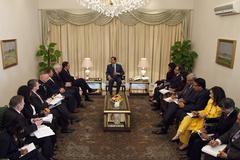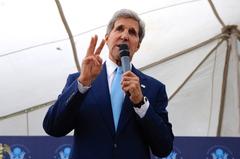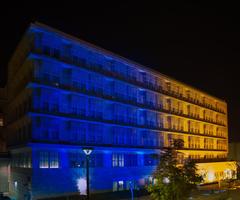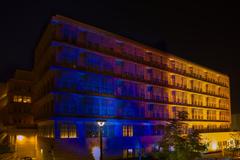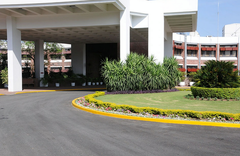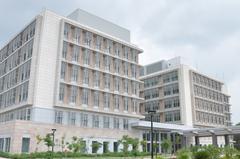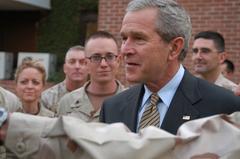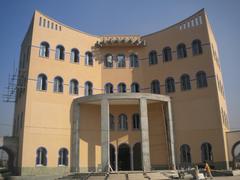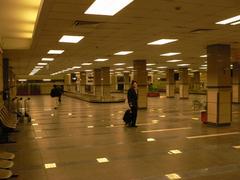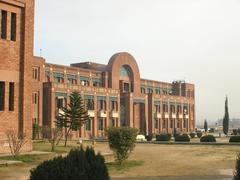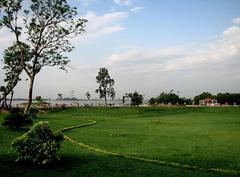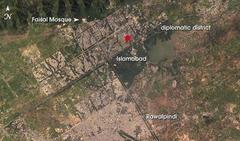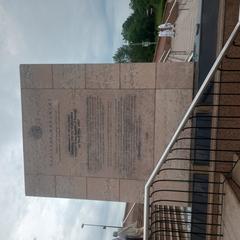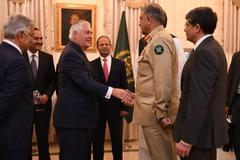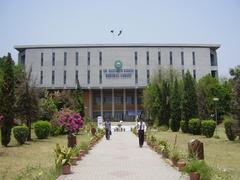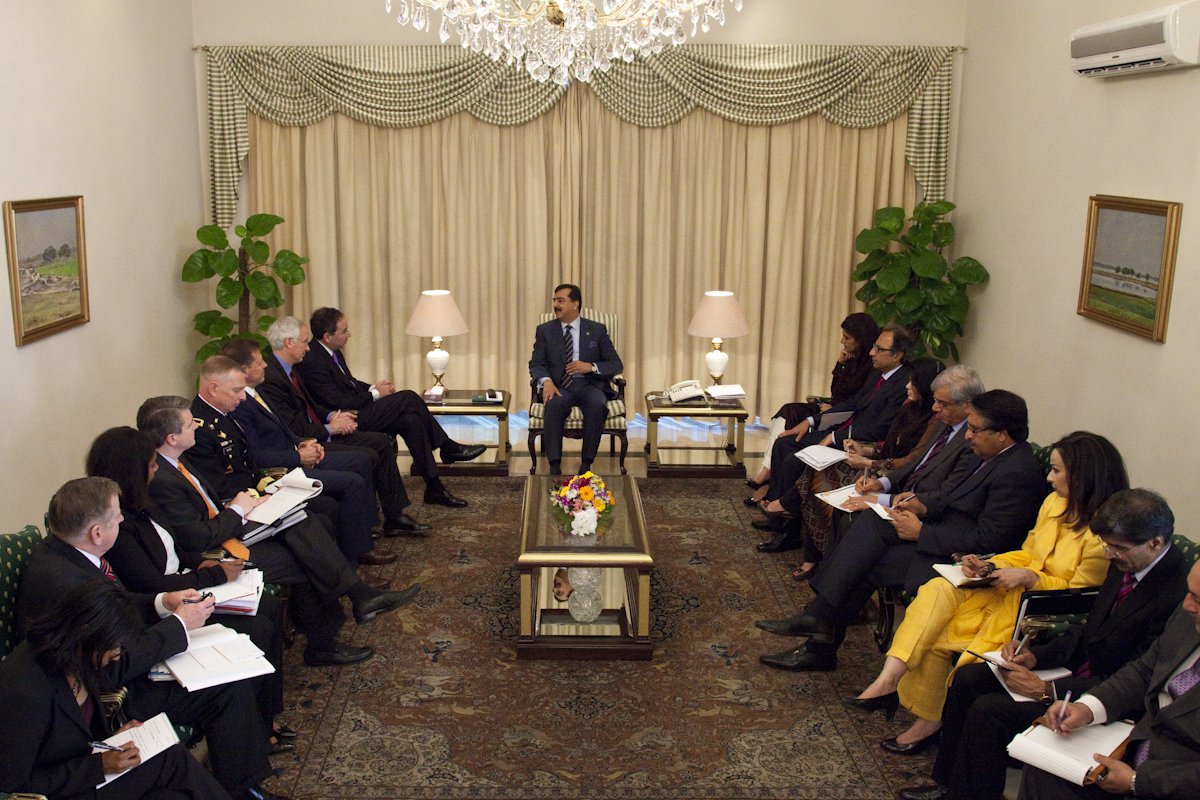
Visiting the Embassy of the United States in Islamabad, Pakistan: Visiting Hours, Tickets, and Tips
Date: 14/06/2025
Introduction
The Embassy of the United States in Islamabad, Pakistan, serves as a pivotal center for diplomatic engagement, consular services, and cultural exchange between the U.S. and Pakistan. Rooted in a relationship that began shortly after Pakistan’s independence in 1947, the embassy is not only a hub for international cooperation but also a symbol of evolving bilateral relations. This guide offers a detailed overview of the embassy’s historical significance, visitor protocols, architectural features, and practical advice for those planning a visit, including information on appointment procedures, security requirements, accessibility, and nearby attractions. For the most up-to-date information, consult the official U.S. Embassy Islamabad website and recommended resources (pk.usembassy.gov; statemag.state.gov; EmbassyPages).
Table of Contents
- Introduction
- Historical Overview and Diplomatic Significance
- Visitor Information
- Nearby Attractions
- U.S. Embassy Memorial Garden
- FAQs
- Conclusion
- References
Historical Overview and Diplomatic Significance
Early Years and Establishment (1947–1960)
Diplomatic relations between the United States and Pakistan were formally established on August 15, 1947, just one day after Pakistan’s independence. The first U.S. Embassy was located in Karachi, then the capital. The early years were characterized by growing cooperation in defense and economic development, influenced by Cold War dynamics and Pakistan’s strategic geography (pu.edu.pk).
Relocation to Islamabad and Expansion (1960–1979)
With the capital’s move to Islamabad in the early 1960s, the U.S. Embassy relocated to the Diplomatic Enclave. The embassy’s presence grew alongside Pakistan’s increasing role in regional and international affairs, including participation in alliances like SEATO and CENTO and in U.S.-funded development programs (statemag.state.gov).
The 1979 Embassy Burning: A Turning Point
On November 21, 1979, the U.S. Embassy in Islamabad was attacked and set ablaze by a mob, resulting in casualties and a global reassessment of diplomatic security. This crisis profoundly impacted U.S.-Pakistan relations and led to enhanced security protocols for U.S. missions worldwide (en.wikipedia.org).
Security Enhancements and Modernization (1980–2015)
The embassy emerged from the 1979 crisis with reinforced security measures. In 2015, a new embassy compound opened in Islamabad’s Diplomatic Enclave. With a construction cost exceeding $700 million, it is among the largest and most secure U.S. diplomatic missions globally, incorporating state-of-the-art safety, environmental sustainability, and accessibility features (statemag.state.gov; Dawn).
The Embassy’s Role in U.S.-Pakistan Relations
The embassy supports a broad range of activities, from facilitating defense and security cooperation to administering educational programs like Fulbright and providing consular services to American citizens and visa applicants. Its work spans economic development, climate action, health, and interagency coordination (pk.usembassy.gov).
Recent Developments and Diplomatic Significance (2015–2025)
Recent years have seen the embassy focus on economic engagement, governance, climate initiatives, and cultural exchange, especially following the U.S. withdrawal from Afghanistan. High-profile events such as annual Independence Day celebrations continue to underscore the partnership between the two nations (thediplomat.com; geo.tv).
Visitor Information
Location and Access
The U.S. Embassy is located in Islamabad’s secure Diplomatic Enclave, Ramna 5, near Quaid-e-Azam University Road and Third Avenue. The area is heavily guarded and houses other major embassies, providing both security and privacy for diplomatic operations (USEmbassy.gov; EmbassyPages).
Address:
- Diplomatic Enclave, Ramna 5, Islamabad, Pakistan
Embassy Compound and Architectural Features
The embassy compound, completed in 2015, features fortified perimeters, low-rise buildings for chancery and consular services, seismic and blast protection, sustainable landscaping, and architectural elements inspired by local traditions. The compound spans approximately 35 acres and accommodates hundreds of staff (Dawn).
Visiting Hours and Appointment Procedures
- Operating Hours: Monday to Friday, 8:00 AM to 4:30 PM (closed on U.S. and Pakistani holidays)
- Entry: By pre-scheduled appointment only. Walk-ins are accepted only in emergencies involving U.S. citizens.
- How to Book: Schedule your appointment online via the embassy’s official website (pk.usembassy.gov).
- Arrival: Arrive at least one hour before your appointment. Late arrivals may need to reschedule.
Shuttle Service
Due to enclave security, visitors must use the dedicated Diplomatic Shuttle Service from Third Avenue (near Quaid-e-Azam University Road). A nominal fee is charged for the shuttle; no private vehicles are permitted inside the enclave without prior authorization.
Visa and Consular Services
The embassy offers a range of consular services, including:
- Visa application processing
- Passport renewal for U.S. citizens
- Notarial services
- Emergency assistance for American citizens
All routine services require an appointment, which can be booked via the official website (pk.usembassy.gov).
Accessibility
The embassy is fully accessible for visitors with disabilities, featuring ramps, elevators, and accessible restrooms. Notify the embassy in advance if you require special assistance.
- Companions: Interpreters, caregivers, and family members are permitted, subject to security screening and ID checks.
Safety and Security Considerations
Strict security protocols are in place:
- All visitors undergo screening (metal detectors, bag checks).
- Prohibited items include: large bags, electronic devices, cameras, weapons, food, and beverages.
- No storage for prohibited items; dispose of them before entry.
- Visitors must present valid government-issued ID; U.S. citizens should bring their passports.
The U.S. Department of State routinely updates travel advisories; consult (Travel.State.Gov) prior to your visit.
Nearby Attractions and Travel Tips
While the embassy is not a tourist site, several notable attractions are nearby:
- Pakistan Monument: A national symbol commemorating unity and independence (PakistanToursGuide).
- Faisal Mosque: The largest mosque in Pakistan, known for its striking architecture.
- Lok Virsa Museum: Exhibits on Pakistan’s diverse cultural heritage.
- Daman-e-Koh: Scenic viewpoint over Islamabad.
- Rawal Lake: Popular for outdoor recreation.
Travel Tips:
- Arrive early to account for security procedures.
- Use taxis or ride-hailing services to reach the shuttle pickup point.
- Carry minimal personal items to expedite security checks.
- Wear modest attire and comfortable footwear.
- Confirm hours and entry requirements for nearby attractions before visiting.
Visiting the U.S. Embassy Memorial Garden in Islamabad: Hours, Access, and Cultural Significance
Introduction
The U.S. Embassy Memorial Garden within Islamabad’s Diplomatic Enclave stands as a symbol of friendship and remembrance, honoring individuals who have contributed to U.S.-Pakistan relations. The garden offers a peaceful space for reflection and is sometimes open to the public during special events and ceremonies.

History and Cultural Significance
The garden features plaques and commemorative installations that underscore the depth of cultural and diplomatic ties between the two nations.
Visiting Hours and Access
- Location: Diplomatic Enclave, Ramna 5, Islamabad
- Hours: Monday to Friday, 9:00 AM–4:00 PM (by appointment or during public events)
- Entry: Free with advance registration via the embassy website or Public Affairs Office.
- Access: Use the designated shuttle service; private vehicles are not permitted.
Special Events and Guided Tours
The garden occasionally hosts commemorative ceremonies and cultural events. Guided tours may be arranged during these times.
Accessibility
The Memorial Garden is wheelchair accessible. Contact the embassy ahead of your visit for special assistance.
Travel Tips
- Adhere to modest dress and security protocols.
- Photography is allowed in approved areas, but cameras may be restricted elsewhere within the enclave.
- English is widely spoken; knowing basic Urdu phrases can be helpful.
Nearby Attractions
Visitors can combine their trip to the Memorial Garden with visits to the Faisal Mosque, Lok Virsa Museum, and Daman-e-Koh.
Summary Table: U.S. Embassy Memorial Garden Visitor Information
| Aspect | Details |
|---|---|
| Location | Diplomatic Enclave, Ramna 5, Islamabad |
| Visiting Hours | Mon–Fri, 9:00 AM–4:00 PM (appointment/special events) |
| Entry Fee | Free (advance registration required) |
| Access | Shuttle service only |
| Photography | In approved areas only |
| Accessibility | Wheelchair accessible |
| Special Events | Ceremonies, cultural events |
| Nearby Attractions | Faisal Mosque, Lok Virsa Museum, Daman-e-Koh |
| Official Website | U.S. Embassy Islamabad |
Frequently Asked Questions (FAQ)
Q: What are the U.S. Embassy Islamabad visiting hours?
A: Monday to Friday, 8:00 AM–4:30 PM (except holidays). Appointments are mandatory.
Q: How do I apply for a U.S. visa in Islamabad?
A: Book an appointment and prepare documents as per official guidelines.
Q: Are embassy tours open to the public?
A: No public tours are offered due to security protocols.
Q: What security measures are in place?
A: ID checks, screening, and restrictions on personal items. No storage for prohibited items.
Q: Is the embassy accessible for visitors with disabilities?
A: Yes, with ramps, elevators, and restrooms; notify in advance if you need assistance.
Q: Can I bring someone with me?
A: Interpreters, caregivers, and family are allowed; all must undergo security checks.
Q: Is there an entry fee for the embassy or Memorial Garden?
A: No entry fee, but a shuttle service fee applies for embassy access; Memorial Garden is free with registration.
Conclusion
Visiting the U.S. Embassy in Islamabad requires careful planning due to its secure location and stringent access procedures. By familiarizing yourself with appointment systems, security measures, accessibility features, and nearby cultural sites, you can ensure a smooth and enriching visit. Always consult the official embassy website for the latest updates, and consider downloading the Audiala app for real-time information and travel tips. Engaging responsibly with embassy resources and Islamabad’s attractions will deepen your appreciation for U.S.-Pakistan relations and the city’s diplomatic landscape (pk.usembassy.gov; thediplomat.com; geo.tv).
References and Links to Official Embassy Website and Related Resources
- U.S. Embassy in Islamabad: History, Visiting Information, and Diplomatic Significance, 2025, Imrana Mushtaq (https://pu.edu.pk/images/journal/csas/PDF/22%20Imrana%20Mushtaq_29_1.pdf)
- U.S. Embassy Islamabad Visiting Hours, Appointment Procedures, and Accessibility Guide, 2024 (https://pk.usembassy.gov/)
- Visiting the Pakistan Monument in Islamabad: Hours, Tickets, and Tourist Information, 2024 (https://www.pakistantoursguide.com/islamabad/)
- Visiting the U.S. Embassy Memorial Garden in Islamabad: Hours, Access, and Cultural Significance, 2024 (https://pk.usembassy.gov/islamabad/)
- The Diplomat, Critical Minerals Add a New Dynamic to Pakistan-US Relations, 2025 (https://thediplomat.com/2025/04/critical-minerals-add-a-new-dynamic-to-pakistan-us-relations/)
- Geo TV, US Diplomat Underscores Enduring Pakistan-US Ties at Independence Day Celebration, 2025 (https://www.geo.tv/latest/607793-us-diplomat-underscores-enduring-pakistan-us-ties-at-independence-day-celebration)
- EmbassyPages, United States Embassy Islamabad Pakistan (https://www.embassypages.com/unitedstates-embassy-islamabad-pakistan)
- Dawn News, U.S. Embassy Islamabad Construction, 2015 (https://www.dawn.com/news/1190727)
- Wikipedia, 1979 U.S. Embassy Burning in Islamabad (https://en.wikipedia.org/wiki/1979_U.S._Embassy_Burning_in_Islamabad)
